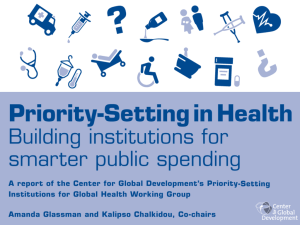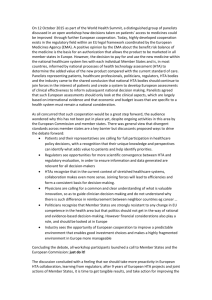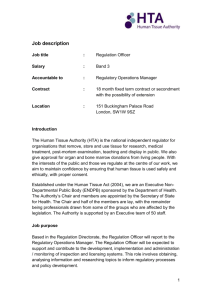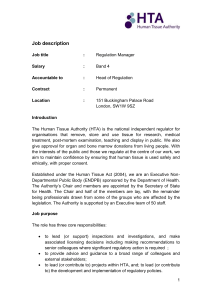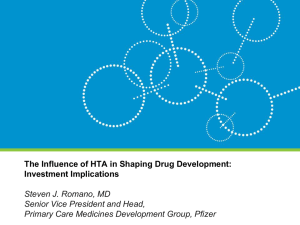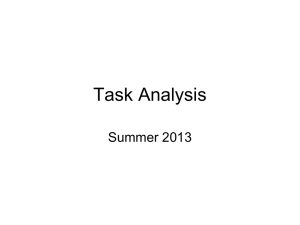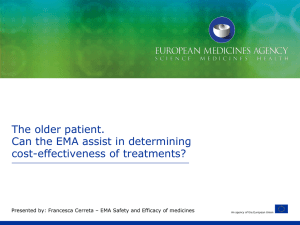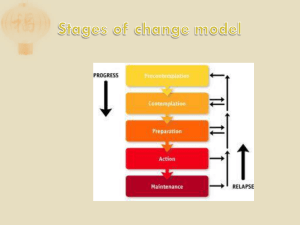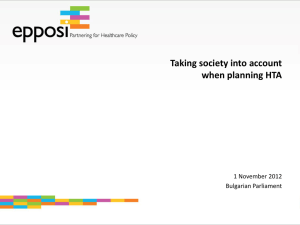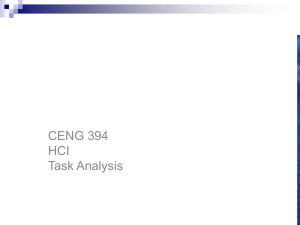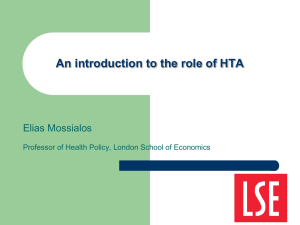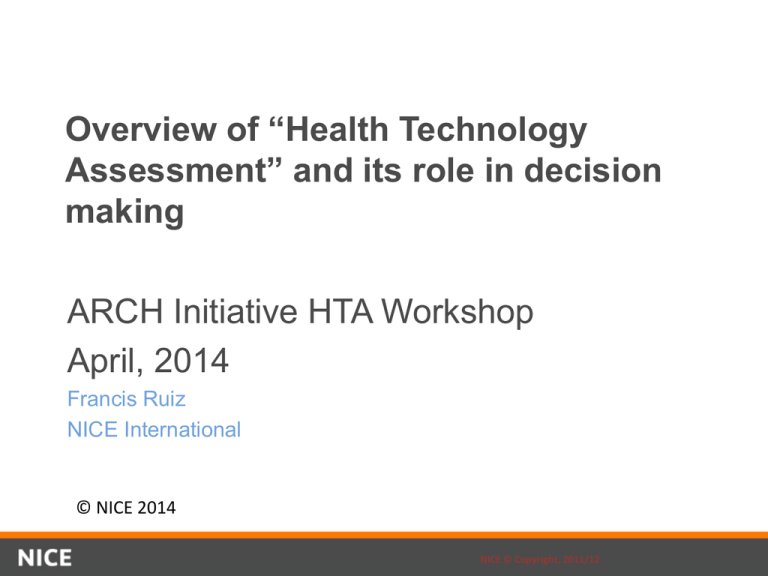
Overview of “Health Technology
Assessment” and its role in decision
making
ARCH Initiative HTA Workshop
April, 2014
Francis Ruiz
NICE International
© NICE 2014
NICE © Copyright, 2011/12
How much is enough?
“We cannot afford everything
that is clinically effective”
"The NHS, just like every other healthcare system in the
world—public or private—has to set priorities and make
choices. The issue is not whether there are choices to
be made, but how those choices are made. There is not
a service in the world, defence, education or health,
where this is not the case."
UK Parliamentary Health Committee
Health systems
everywhere are
under pressure…
Burden of
chronic
disease and
ageing
populations
Users’
expectations
and the promise
of universal
coverage
Policy and
practice
Growth in
technologies –
expanding
marketplace
Finite budgets
and financial
pressures
Payers’ responses
•
•
•
•
•
•
•
Accumulating debt
(Arbitrary) price cuts
Divergence between coverage (in principle) and access
Cost-shifting to service users and their families
Price negotiations
Risk sharing and Value-Based Pricing
‘Institutionalising’ technology adoption decisions:
Health Technology Assessment agencies
• A combination of the above…
What is Health Technology
Assessment?
• Health Technology: “The drugs, devices, and medical
and surgical procedures used in health care, and the
organisational and supportive systems within which
such care is provided”a
– Contraceptives; dialysis machines; mastectomy; screening for cancer;
intensive care unit
• Health Technology Assessment: “a multi-disciplinary
field of policy analysis, which studies the medical,
social, ethical and economic implications of
development, diffusion and use of health technology.”b
a: Office of Technology Assessment. Assessing the efficacy and safety of medical technologies.
Washington DC: U.S. Government Printing Office, 1978;
b: International Network of Agencies for Health Technology Assessment (INAHTA)
HTA as a “tool”
• Evidence-based policy making and Health
Technology Assessment (HTA) can assist
policy makers to:
–
–
–
–
–
–
effectively prioritise health interventions and services
improve their quality
make consistent decisions
reduce inappropriate variation
signal ‘value’ to industry
inform the selection of indicators to assess performance and
incentivise providers
• BUT…not a ‘cure all’ for all system
inefficiencies and problems
Milestones in HTA evolution
• Establishment of Office for Technology
Assessment, USA – 1972
• Emergence of Health Economics as a
discipline – Kenneth Arrow – 1963; USA, UK,
1970s and 1980s
• Evidence Based Medicine movement –
McMaster’s, Canada, 1980s
• Cochrane Collaboration – UK, 1992
• Australian model makes economic evaluation
a mandatory requirement – 1990s (PBAC)
• UK, Canada, Sweden follow…
Evidence Based Medicine
• “EBM is the conscientious, explicit and
judicious use of current best evidence in
making decisions about patient care”
– individual clinical expertise
– best available external clinical evidence
from systematic research
Dimensions of HTA
•
•
•
•
•
Comparative clinical effectiveness
Comparative cost-effectiveness
Service delivery organisation aspects
Legal framework
Ethical, social implications – equity,
fairness and other societal norms
HTA audiences
•
•
•
•
•
Policy-makers - payers
Medical products developers – industry
Healthcare professionals
Academic community - researchers
General public: taxpayers; insured
population
• Patients and their families
NICE © Copyright, 2011/12
Process matters!
Principles
Putting them into practice…
Independence
“Arm’s length” from government, payers, industry and
professional groups; strong and enforced conflict of interest
policies
Transparency
Meetings open to the public; material placed on the web;
decision criteria and rationale for individual decisions made public
Inclusiveness
Wide and genuine consultation with stakeholders; willingness to
change decision in light of new evidence
Scientific basis
Strong, scientific methods and reliance on critically appraised
evidence and information
Timeliness
Decisions produced in reasonable timeframe; minimise delays in
publishing decisions
Consistency
Same technical and process rules applied to all cases
Legal framework
Reference in country’s legal framework; institutional role in
informing coverage and payment decisions
Regular review
Regular updating of decisions and of methods
Guidelines and HTA not a panacea
• Using a NICE evidence-based model (methods and
process) to derive and regularly update an
exhaustive and fully explicit list of services and
technologies will be:
– Resource intensive esp. to keep up-to-date
– Methodologically challenging: calibration of the threshold to avoid
crowding out
– Evidentiary and informationally impossible: need ICER for all services
and technologies: e.g. “cost per QALY / DALY” for one extra nurse per
clinic?
– Politically sensitive and ethically problematic…
versus
Inertial, implicit and
ad hoc resource
allocation can result
in low value and
inequity
Image: DFID - UK Department for International Development/ CC -Image: flickr user mtsofan/ CC
Competing interests in an ad hoc process
drive these perverse choices
Battle between disease and intervention-specific
programmes, NCDs and health systems
strengthening
A CGD report recommends the creation and development
of both domestic and global priority-setting systems, to
accomplish this…
The proposal
Underlying principles
Scientifically rigorous
A global consortium or
network to provide
sustained technical and
consultative support to
both low- and middleincome countries (LMIC)
governments and global
funders.
Independent
Timely
Flexible
Sustainable
Collaborative
Non bureaucratic
Source: Priority-Setting in Health, Building institutions for smarter public spending. A report of the Center for Global
Development´s Priority-Setting Institutions for Global Health Working Group. Co-chairs, Amanda Glassman and
Kalipso Chalkidou, 2012 (Priority-Setting Report 2012).
18
The need, demand, and supply of HTA / evidence-based
priority setting is different in every country:
Need for HTA:
Demand for HTA
What policy decisions will
be informed by HTA?
Who (departments,
institutions) will be using the
outputs of HTA?
Supply of HTA:
Who (departments, institutions)
will be conducting HTA and
running the HTA process?
HTA-related activities - ARCH
HTA and Tobacco Control
Examples
NICE….what is it ?
The National Institute for Health and Care
Excellence (NICE) provides national
guidance and advice to improve health and
social care
We do this by:
•
Producing evidence-based guidance and advice for health, public health
and social care practitioners.
•
Developing quality standards and performance metrics for those
providing and commissioning health, public health and social care services;
•
Providing a range of information services for commissioners,
practitioners and managers across the spectrum of health and social care.
•
•
•
•
•
•
•
•
•
NICE Public health guidance:
Key stages
Department of Health referral
Stakeholders register interest
Scope prepared
Evidence reviewed
Draft guidance prepared
Consultation on draft guidance
Fieldwork (optional)
Finalising the guidance
Publication, dissemination, implementation
• “A cohort simulation model was designed
to estimate the costs and quality-adjusted
life years (QALYs) associated with
smoking cessation. The model was
designed to compare different smoking
cessation interventions to determine their
incremental cost-effectiveness.”
Markov process
Smokers
Death
Former
Smokers
Considers cohort of
current smokers
Each year they become
– Current smokers
– Former smokers
– Die
Health outcomes and
resource use driven by
smoking status
26
The economic model
Smokers and former smokers each have a risk of
developing a number of smoking attributable
conditions & death
– CVD, MI, COPD, lung cancer
Healthcare resource use, QOL/utility and productivity
also dependent on smoking status
Majority of data derived from previous analyses
(Flack, Taylor, Trueman)
27
Findings (1)
• Taking into account also the published
literature and previous cost effectiveness
analyses….
• “Overall, brief advice, individual
behavioural counselling, group behaviour
therapy, pharmacotherapies, self-help
materials, telephone counselling and
quitlines were cost effective compared
with no intervention….” Etc
Findings (2)
• But there were data gaps, and research
recommendations made:
• “More information is needed about both
the cost-effectiveness of workplace
interventions and their long-term
effectiveness, particularly in the context of
widespread smoking restrictions.”
In conclusion, the national ‘Stoptober’ mass
media smoking cessation campaign featuring
digital support appears to have provided
excellent value for money as a life-saving public
health intervention. Designing a national public
health campaign with a clear behavioural target
(making a serious quit attempt) using key
psychological principles can yield a substantial
return in terms of behaviour change and public
health impact.
Microsimulation and
forecasting models (1)
• Modelling future incidence and cost burden of smoking related
diseases
• Can use to explore impact of possible national / subnational
interventions e.g. increased tax on tobacco
• E.g. UK Health Forum approach
• Two step process
– Risk factor distribution analysis over time
– Longitudinal analysis of individuals based on risk factor analysis using
Monte Carlo simulation methods (uses random numbers)
• UKHF have developed models in obesity (over 80 countries)
• Preliminary tobacco model developed for Botswana (with support
from the World Bank)
Microsimulation and
forecasting models (2)
• Botswana model – data requirements:
–
–
–
–
–
–
–
Risk factor data – 3+ years tobacco prevalence
Incidence (or prevalence) data by age and sex
Mortality (age and sex)
Survival data for each disease
Population data (births and deaths etc)
Relative risk for each disease
Health costs (total costs by disease)
• Data included information from countries other
than Botswana to fill in the gaps
Microsimulation and
forecasting models (3)
• Botswana model – intervention analysed (a levy on
tobacco) (Note WHO Framework on Tobacco Control
recommending price and tax measures)
• Price elasticity = - 0.6 (10% increase in tobacco excise
duty would result in a 6% reduction in smoking rates – in
line with other countries)
• Other assumptions (e.g. smokers who smoke any
amount have same risk of disease)
• Can estimate disease prevalence and costs avoided
– Policy implications (positive health benefits, increased tax
revenue, reduction in healthcare costs…)
Thanks to: HITAP, Tim Marsh (UKHF), Subhash Pokhrel (Brunel
University) and Amanda Glassman (CGD)

